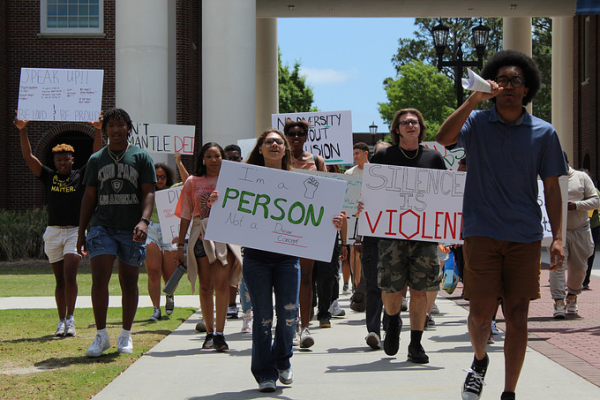Justice Department challenges N.C. voting laws
October 14, 2013
As a direct challenge to North Carolina’s Voter ID law, the United States Department of Justice is suing the state.
Filing the lawsuit late last month, Attorney General Eric H. Holder Jr. said the law would dampen the voting process in North Carolina. Groups such as students and minorities would be disenfranchised in elections following the 2016 year, according to Holden.
“By restricting access and ease of voter participation this new law would shrink, rather than expand, access to the franchise,” he said in a news conference. “It defies common sense.”
The controversial law cuts the number of early voting hours in half; eliminates same-day voter registration; requires the presentation of a photo ID in order to vote; and prohibits casting ballots outside of a voter’s home precinct.
Civil rights groups such as the NAACP and the American Civil Liberties Union will rally with the Justice Department’s litigation of the state under the same pretense: that voter law will skew student and minority voter turnout.
In a short news conference, N.C. Gov. Pat McCrory claimed that the Justice Department’s suit was a federal overreach into state matters.
The N.C. Voter ID law was signed not long after the Supreme Court declared section four(b) of the 1965 Civil Rights Act unconstitutional. Section four held nine states—Alabama, Alaska, Arizona, Georgia, Louisiana, Mississippi, South Carolina, Texas and Virginia—under supervision, preventing them from ratifying voter changes without federal approval.
Before the Justice Department filed action against North Carolina, it targeted Texas for similar grounds of “discriminatory intent” with voting amendments.
“The Department of Justice has responded with proportional degree to that speed of the Texas and North Carolina legislatures in passing their legislation after section 4 of the voting rights act was declared unconstitutional,” said Dakota Ray Cary, vice president of UNC Wilmington College Democrats.
She also said that N.C.’s litigation was unsurprising, since the Justice Department had been considering bringing action to the state soon after Texas.
However, demonstrating that such changes in Texas and North Carolina are discriminatory will pose as a difficult task for Holder, since the effects are all in theory.
Craig Burnett, a political science professor at UNCW, said political research has illustrated reduced voter turnout if additional burdens—either through monetary or registration difficulties—are applied to the voting process. Yet it will be Holder’s challenge to clearly demonstrate the law’s disproportional negative impact on minorities.
“There’s an argument on both sides,” said Michael Haas, pre-law advisor at UNCW. “The Republicans like this bill, since it’s supposed to prevent fraud. But why make it harder to vote?”
Haas said it will be difficult for Holder to prove deliberate targeting of a minority or students because the law itself ensures everyone can obtain a free photo ID by 2016.
UNCW’s College Republicans are confident the Department of Justice will not succeed in suppressing the voter ID law because they believe the accusations are not legally founded.
“These outrageous and defamatory accusations show blatantly partisan motives which are inappropriate for our federal government, while implying the people of North Carolina are incapable of electing ethical representatives,” said James Northrop, president of UNCW’s College Republicans.














